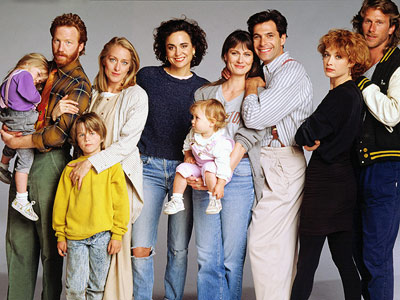
Bet you thought it would never happen: That oh-so-'80s fave thirtysomething finally hits DVD this week.
And it turns out to be oh-so-21st-century, too.
"It's about the problem of trying to be a good man or woman in an impossible world," says series writer Richard Kramer, in one of the six-disc set's many illuminating extras. (Thanks, Shout Factory!) "There's nothing about being a yuppie in that," Kramer says. "That, I think, applies to everybody."
"It's about trying to become grownups," says actress Patricia Wettig (who played Nancy), in the same DVD featurette that assesses the show's cultural impact. "How do you begin to have one of those real lives?"
That wasn't something TV dealt with in the '80s, despite the arrival of smart adult dramas like St. Elsewhere, The Paper Chase and China Beach. Those shows were built around outward concerns -- medicine, law school, the Vietnam War. But thirtysomething was all about introspection -- young urban professionals, dissecting their lives-in-progress, aspiring to "have it all," yet stumbling through this unfamiliar game called adulthood. Which turned out to be played mostly through such everyday concerns as babies crying in restaurants, friends resenting your new parental obsession, bosses asking you to betray your ideals in pursuit of profit -- all those demands suddenly being juggled by pressured souls who'd so recently been blithe spirits.
 "Hill Street Blues had incorporated the personal into the procedural," says Timothy Busfield, cast member (Elliot) turned director-producer (Ed, Without a Trace), in a recent phone interview about the DVD release for my Sunday feature in Newsdayabout the show's profound (and continuing) influence on TV. "But we were just personal," Busfield says. "To be able to say, 'Here's how I'm sort of evaluating my life' -- the ability to connect with the audience, and sort of wink, and say, 'Hey, check it out, guys. Here's where we're blunderous, here's where we need to evolve.' To have that opportunity in television, which was primarily reserved for independent features, was at that time so rare."
"Hill Street Blues had incorporated the personal into the procedural," says Timothy Busfield, cast member (Elliot) turned director-producer (Ed, Without a Trace), in a recent phone interview about the DVD release for my Sunday feature in Newsdayabout the show's profound (and continuing) influence on TV. "But we were just personal," Busfield says. "To be able to say, 'Here's how I'm sort of evaluating my life' -- the ability to connect with the audience, and sort of wink, and say, 'Hey, check it out, guys. Here's where we're blunderous, here's where we need to evolve.' To have that opportunity in television, which was primarily reserved for independent features, was at that time so rare."
This was auteur TV. In a separate phone interview, series creators Marshall Herskovitz and Ed Zwick stressed that they weren't alone in trying to subvert that wall separating writers and viewers by making it clear we were all muddling through together. "There was Glenn Gordon Caron with Moonlighting," says Zwick. "And John Sacret Young with China Beach," adds Herskovitz. (Another show too long MIA on DVD.)
"But you have to understand how clueless we were," says Zwick. "We weren't veterans of television," says Herskovitz. "We were just applying what we'd learned in our own lives."
On Shout's DVD set, the duo -- still working together making films like Blood Diamond -- revisit those stumbling-into-greatness days while trading memories in an editing bay. Both 35 at the time, they considered themselves movie makers, and wrote a TV pilot only under studio duress. "What could we do that we would like, if we had to do it, but would be certain to fail?" remembers Herskovitz. "The baby boomer generation is not represented on television. Why don't we write about the people we know?"
Says Zwick, "It was about looking close to home, and inside."
When thirtysomething premiered in 1987, TV's highest-rated drama was Murder, She Wrote. Even Dallas was still going strong. L.A. Law had become a feisty adult favorite, but its smirking quirks could hardly be called earnest or intimate.
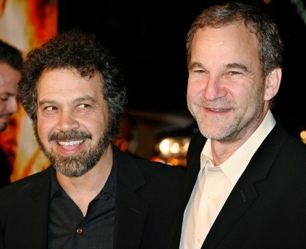 Which, of course, thirtysomething's pilot was (perhaps to excess). ABC's young programming executives were so moved, they bought the series. Zwick and Herskovitz were doing something radical, and though they had no illusions it would succeed in the ratings, at least it would make them happy. "We were so idealistic," Herskovitz muses on the DVD. "We couldn't abide the idea that this thing would be compromised. We were willing to walk away rather than make it bad."
Which, of course, thirtysomething's pilot was (perhaps to excess). ABC's young programming executives were so moved, they bought the series. Zwick and Herskovitz were doing something radical, and though they had no illusions it would succeed in the ratings, at least it would make them happy. "We were so idealistic," Herskovitz muses on the DVD. "We couldn't abide the idea that this thing would be compromised. We were willing to walk away rather than make it bad."
They hired writers who felt the same -- Richard Kramer, who'd go on to such smart shows as Tales of the City and Nothing Sacred. And Paul Haggis, whose TV gems Due South and EZ Streets led to the movies, an Oscar nomination for Million Dollar Baby, and a best picture win for Crash. Winnie Holzman would later create My So-Called Life for producers Zwick and Herskovitz.
"We had this idea of what we called the dialectic," Herskovitz remembers on the DVD. That meant exploring their generation's "ambivalence, that things exist in opposition to each other. You want to be free, but you also want money." "You want to be single," says Zwick, "and you want to be in a relationship." "You want to please your client," says Herskovitz, "and you want to feel that you have integrity . . . Many of them were true meditations upon a theme."
Meditations? Yes, network TV would actually take the time to stop and think -- thirtysomething indulged a measured, heartfelt humanity that even the best shows today lack the breathing room to convey.
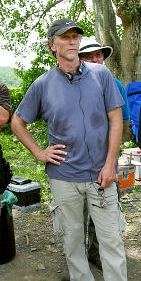 "I think in network television, that period of time stands alone," says Peter Horton, another actor (Gary) turned director-producer (The Philanthropist), in another recent phone interview. "There's been a real retreat from that kind of creative exploration and creative freedom. Sadly, network television has really ebbed away from that. They're going for much more dazzle and flash, trying to stand out in a crowded marketplace."
"I think in network television, that period of time stands alone," says Peter Horton, another actor (Gary) turned director-producer (The Philanthropist), in another recent phone interview. "There's been a real retreat from that kind of creative exploration and creative freedom. Sadly, network television has really ebbed away from that. They're going for much more dazzle and flash, trying to stand out in a crowded marketplace."
That's why thirtysomething hasn't hit DVD until now. It "hadn't been a priority" for release at owning studio MGM, Herskovitz says by phone. "The studios have bigger to fish to fry," explains Garson Foos of Shout Factory, the pop culture distributor that steps up when large studios focus instead on recent productions more likely to sell big.
Shout's loving releases have ranged from such recent faves as Freaks and Geeks and The Middleman all the way back to '60 single-camera sitcom pioneer Room 222, original nighttime soap Peyton Place, and Groucho Marx' You Bet Your Life -- all lavished with bonus archive footage, new interviews and more. "They really take it seriously," Zwick says.
For thirtysomething, new video masters were struck to make the episodes look fresh, and Shout jumped through hoops to secure rights to the show's pioneering use of pop songs. Music rights are often the hold-up for vintage favorites stuck in the vault. "Because we're putting so much TV-on-DVD out that has music rights issues," Foos says by phone, "we're able to negotiate at least a little more favorable deals. Because we come from the music business [he and brother Richard Foos were behind Rhino], we have great relationships with the labels and publishers."
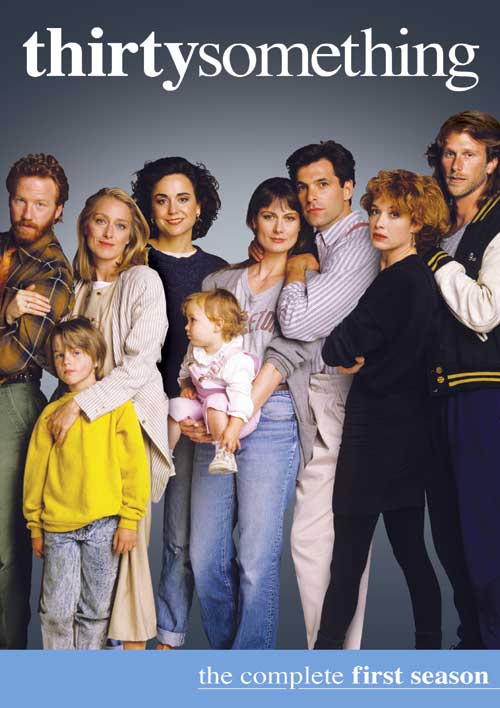 The industry knows Shout brings the love, too. "When we feel like the show is really something that was important culturally," Foos says, they go to town. The thirtysomethingbox boasts specially produced retrospectives, interviews with all the cast and key crew, a variety of episode commentaries, and an insightful 40-page book about the show's impact as "an influential, very groundbreaking show. It's such good writing and storytelling and character development. I think those issues are the kinds of issues that people are grappling with always. It wasn't unique to that period of time."
The industry knows Shout brings the love, too. "When we feel like the show is really something that was important culturally," Foos says, they go to town. The thirtysomethingbox boasts specially produced retrospectives, interviews with all the cast and key crew, a variety of episode commentaries, and an insightful 40-page book about the show's impact as "an influential, very groundbreaking show. It's such good writing and storytelling and character development. I think those issues are the kinds of issues that people are grappling with always. It wasn't unique to that period of time."
Except to those who watched at the time, emotionally immersed, as if seeing their own lives laid bare on screen. The actors, too, connected, not only to their characters but to the broader horizons being explored. Busfield and Horton weren't the only ones who'd move behind the camera (while also continuing to act occasionally). So did Ken Olin, now a producer-director on Brothers and Sisters, which costars his real-life wife Wettig. Ditto Melanie Mayron, recently directing In Treatment, and Polly Draper, who created her sons' Nickelodeon series The Naked Brothers Band. All got their feet wet doing episodes of thirtysomething. Horton says, "We called it Ed's samurai school of directing."
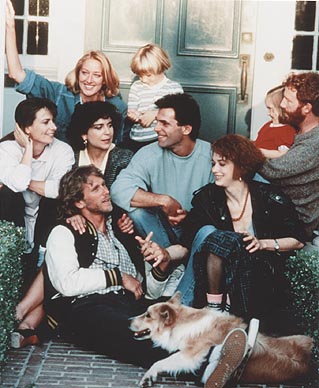 So the show touched their hearts as profoundly as it did viewers. "It's been a pebble in our shoes all these years," Horton muses by phone. "Here we have this show that we so fully participated in and so adore, and we're living in a world of DVDs and shows living on at your command -- and it's every other show but ours. It was in obscurity on a shelf somewhere, and that was such a source of irritation and frustration. But I think with the idea that it's finally coming out, that's us finally getting to scratch that itch."
So the show touched their hearts as profoundly as it did viewers. "It's been a pebble in our shoes all these years," Horton muses by phone. "Here we have this show that we so fully participated in and so adore, and we're living in a world of DVDs and shows living on at your command -- and it's every other show but ours. It was in obscurity on a shelf somewhere, and that was such a source of irritation and frustration. But I think with the idea that it's finally coming out, that's us finally getting to scratch that itch."
Us, too.
[For more on thirtysomething's wide-ranging influence on TV over the past two decades, read my Sunday feature for Newsday here. You can buy the first-season DVD at a sizable discount from Amazon here.]